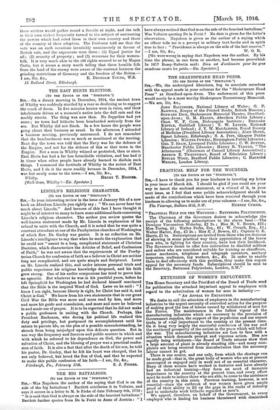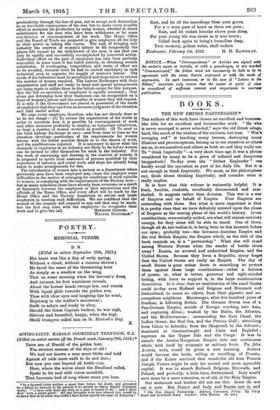EXTENSION OF WOMEN'S EMPLOYMENT.
THE Home Secretary and the President of the Board of Trade send for publication the attached important appeal to employers with
regard to the substitution of women for mon in industry :— " AN APPEAL TO EMPLOYERS.
We desire to call the attention of employers in the manufacturing industries to the urgent necessity of concerted action for the purpose of making good the loss of labour caused by withdrawal of men for the Forces. The maintenance in the fullest vigour of the manufacturing industries which are necessary to the provision of Government supplies, the support of the population and our export trade, is of vital importance to the country at the present time. On it hang very largely the successful conclusion of the war and the continued prosperity of the nation in the years which will follow the war. The manufacturing industries are face to face with a situation which demands prompt and vigorous action. Men are rapidly being withdrawn—the Board of Trade returns show that a large amount of plant is already standing idle—and many com- plaints are being received from manufacturers that the necessary labour cannot be got. There is one source, and one only, from which the shortage can be made good—that is, the great body of women who are at present unoccupied or engaged only in work not of an essential character. Many of these women have worked in factories and have already had an industrial training—they form an asset of immense importance to the country at the present time, and every. effort must be made to induce those who are able, to come to the assistance of the country in this crisis. Previous training, however, is not essential—since the outbreak of war women have given ample proof of their ability to fill up the gaps in the ranks of industry and to undertake work hitherto regarded as men's.
Wo appeal, therefore, on behalf of the Government, to every employer who is finding his business threatened with diminished
productivity through the loss of mon, not to accept such diminution es an inevitable consequence of the war, but to make every possible effort to maintain his production by using women, whether in direct substitution fur the men who have been withdrawn or by some sub-division or rearrangement of his work. The Home Office and the Board of Trade are prepared to give employers all the help in their power in taking this course. The task of bringing into industry the reserves of women's labour to fill temporarily the places left vacant by the withdrawal of the men, is one that can only be rapidly and successfully accomplished by concerted action. Individual effort on the part of employers has only been partially successful, in some cases it has failed entirely, in obtaining women substitutes. If overlapping, competition, and waste of effort are to be avoided, recourse must be had to central machinery in each industrial area to organize the supply of women's labour. The needs of the industries must be ascertained and steps taken to attract the number of women required. The Labour Exchanges with their organization and staff are ready to hand and special arrangements are being made to utilize them to the fullest extent for this purpose. But the full co-operation of employers is equally necessary ; they alone can determine how their businesses can be reorganized on a basis of women's labour and the number of women they will require. It is only if the Government are placed in possession of the needs of employers that they can form an accurate judgment of the situation and take useful action.
We urge every employer, therefore, who has not already done so to do two things :—(l) To review the organization of his works in order to ascertain how it is possible by rearrangement of work and other measures profitably to employ, as temporary substitutes, as large a number of women workers as possible. (2) To send to the local Labour Exchange at once—end from time to time as the situation develops—particulars of his requirements for women labour, with the fullest possible details as to the dosses of work, and the qualifications required. It is necessary to know what the demands of employers in an industry are likely to be before women can be invited to offer themselves for work in the industry. For the work of canvassing and drawing in the reserves of women, it is proposed to invite local assistance of persons qualified by their experience of industry and social work, and steps are already being taken to make arrangements for this. The introduction of women into a factory or a department where previously men have been employed may cause the employer some difficulties in the matter of arranging for conditions of work suitable to women, or complying with the requirements of the Factory Ada- k& in many industries these have already been overcome as a result of discussion between the employers or their associations and the officials of the Home Office, and every effort will bo made by the Home Office and the Factory Inspectors to advise and assist employers in meeting such difficulties. We are confident that the women of the country will respond to any call that may be made, but the first step rests with the employers—to reorganize their WALTER RUNCIMAN.“



































 Previous page
Previous page